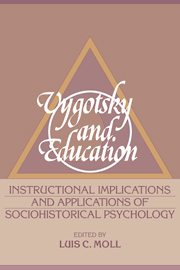Book contents
- Frontmatter
- Contents
- List of contributors
- Preface
- Acknowledgments
- Introduction
- Part I Historical and theoretical issues
- Part II Educational implications
- 7 Teaching mind in society: Teaching, schooling, and literate discourse
- 8 A Vygotskian interpretation of Reading Recovery
- 9 Vygotsky in a whole-language perspective
- 10 The development of scientific concepts and discourse
- Part III Instructional applications
- Name index
- Subject index
8 - A Vygotskian interpretation of Reading Recovery
Published online by Cambridge University Press: 05 June 2012
- Frontmatter
- Contents
- List of contributors
- Preface
- Acknowledgments
- Introduction
- Part I Historical and theoretical issues
- Part II Educational implications
- 7 Teaching mind in society: Teaching, schooling, and literate discourse
- 8 A Vygotskian interpretation of Reading Recovery
- 9 Vygotsky in a whole-language perspective
- 10 The development of scientific concepts and discourse
- Part III Instructional applications
- Name index
- Subject index
Summary
This is an analysis of one tutorial program, Reading Recovery (RR), for children who have been in school for 1 year and have not yet “caught on” to reading and writing. RR was designed and evaluated by Clay in New Zealand (1979, 1985; Clay & Watson, 1982) and will soon be available to children who need it throughout that country. Because of its success there, it is being tried out in the United States, notably through Ohio State University (Lyons, 1987; Pinnell, 1985, 1988). Cazden learned about RR while on extended stays in New Zealand during 1983 and 1987 and became interested in features of its instructional design after viewing videotapes of New Zealand RR lessons.
R was designed from Clay's theory of the nature of reading, observations of children's behavior in learning to read, and collaboration with experienced New Zealand infant school teachers. Although no thought was given to Vygotsky's theories during this program development, it is possible to interpret features of RR in Vygotskian terms. At first it seemed to Cazden that RR was simply an elegant example of scaffolded instruction (Cazden 1979, 1988). As we worked together on this chapter, more relationships to Vygotsky's ideas appeared.
After a brief introduction to the theory of reading that guides literacy instruction in both regular New Zealand classrooms and RR programs, we analyze features of RR that require teacher (T) and child (C) to collaborate in shared tasks – reading a new book and writing the child's story – and present evidence in both cases of a shift from T/C interindividual functioning to increasingly complex intraindividual functioning by the child.
- Type
- Chapter
- Information
- Vygotsky and EducationInstructional Implications and Applications of Sociohistorical Psychology, pp. 206 - 222Publisher: Cambridge University PressPrint publication year: 1990
- 39
- Cited by



